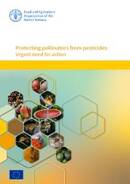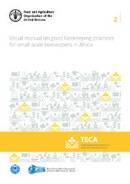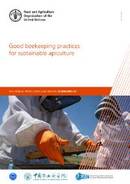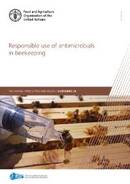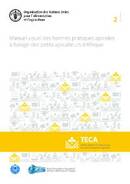Recursos
Protecting pollinators from pesticides – Urgent need for action
Author: FAO
Pollinators are essential for fruit, vegetable, oilseed and forage production, as well as for the production of seed for many root and fibre crops. In addition to being essential to food security and quality, pollinators contribute to the production of medicines, biofuels (e.g. canola and palm oil), fibres (e.g. cotton and linen) and construction materials such as timber. Livelihoods based on beekeeping and honey hunting are embedded in many rural economies. The large importance of pollinators, for both wild and cultivated plants, means they are fundamental to maintain ecosystem services and uphold global biodiversity.
Visual manual on good beekeeping practices for small-scale beekeepers in Africa
This manual is a visual, practical document on good beekeeping practices for sustainable small-scale beekeepers in Africa. It has been designed to serve as a beekeeping training tool and is a concise, practical reference document. The manual opens with an illustrated story of the damaging effect of certain practices adopted when collecting wild honey (honey hunting) and aims to spark interest among readers on how to harvest honey more sustainably. The second section presents the reader with the main beekeeping equipment and explains how the tools can be used to keep healthy bees and harvest quality honey. It ends with an overview of good beekeeping practices that will help the beekeeper produce good honey in a sustainable manner.
Good beekeeping practices for sustainable apiculture
Bees provide a critical link in the maintenance of ecosystems, pollination. They play a major role in maintaining biodiversity, ensuring the survival of many plants, enhancing forest regeneration, providing sustainability and adaptation to climate change and improving the quality and quantity of agricultural production systems. In fact, close to 75 percent of the world’s crops that produce fruits and seeds for human consumption depend, at least in part, on pollinators for sustained production, yield and quality. Beekeeping, also called apiculture, refers to all activities concerned with the practical management of social bee species.
Responsible use of antimicrobials in beekeeping
These guidelines focus on responsible use of antimicrobials in sustainable apiculture. Following a one-health approach, they aim to protect not only honey bees, but even human health (e.g. reducing the risks of residues in hive products and preventing development of antimicrobial resistance) and the environment. The best way to reach this goal is to prevent and to guarantee the early detection of clinical cases of the main honey bee diseases through the application of good beekeeping practices and biosecurity measures.
Manuel visuel des bonnes pratiques apicoles à l’usage des petits apiculteurs d’Afrique
Le présent manuel est un guide visuel fonctionnel des bonnes pratiques apicoles durables à l’usage des petits apiculteurs d’Afrique. Concis et pratique, ce document constitue un outil de référence destiné à la formation apicole. S’ouvrant sur un aperçu illustré des effets préjudiciables de certaines pratiques de récolte sauvage du miel, cette publication entend éveiller l’intérêt des lecteurs partisans d’approches plus durables. Dans une deuxième partie, le guide présente les principaux équipements apicoles en mettant en avant leur utilisation au service de la santé des abeilles et d’une récolte de miel de qualité. Le manuel esquisse enfin les bonnes pratiques apicoles qui permettront aux éleveurs d’abeilles d’obtenir un excellent miel selon des procédés durables.


